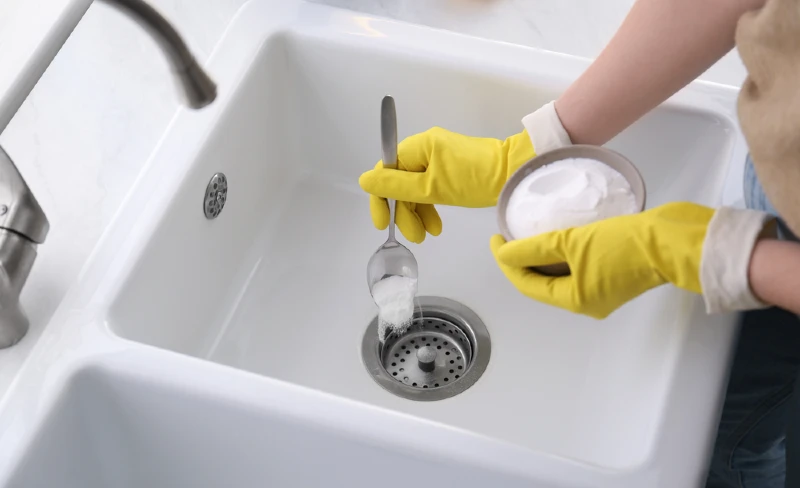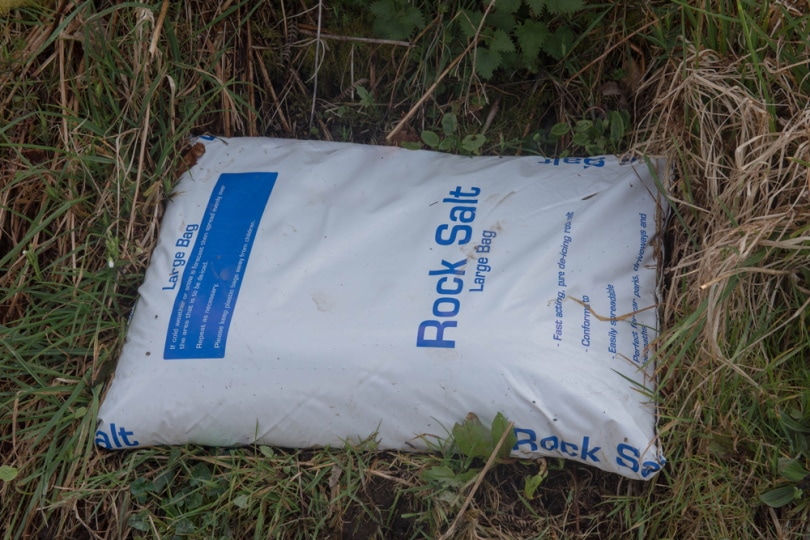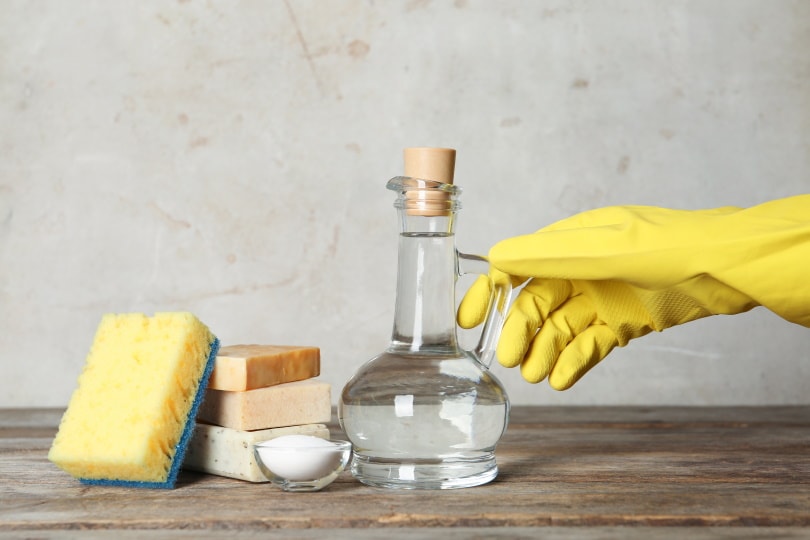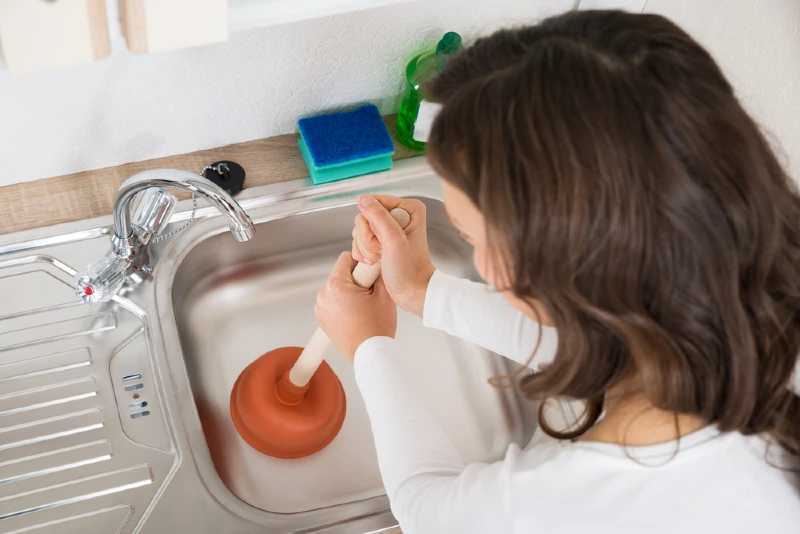Does Pouring Salt Down the Drain Help Clear Clogs? The Interesting Answer
-

- Last updated:

Recently, the internet has been asking whether salt clears clogs when poured down the drain. This is after a clickbait ad encouraging people to pour salt down the drain during the night and pouring hot water through the drain the following morning went viral. The truth is salt cannot be used on its own to clear clogs1 in the drain.
Although the ad did not provide clear evidence of how salt can get rid of clogs firmly attached to the drain walls, there are occasions when it might work alongside other home remedy cleaning agents to clear clogs and eliminate foul odor from the drains.
In this article, we look at why salt on its own may not be effective at clearing clogs and how to combine it with other products to clear clogs. We will also offer alternative ways for clearing clogs. Read on for a deeper insight.
Using Salt to Clear Clogs: Is It a Myth?
The previous use of salt with other cleaning agents like lemon juice, baking soda, and vinegar has made people believe it can also clean clogs on its own. Many think that since it is gritty when it pours down the drain, it will automatically cause a scouring effect that will forcefully remove the firmly holding particles on the walls of the drain through friction.
However, no evidence proves that salt alone can remove clogs without combining these other ingredients. When mixed with the cleaning agents, the salts’ efficiency when unclogging drains is enhanced. But salt alone cannot scrape off clogs from the drain.
Why Pouring Salt Down the Drain May Not Be Effective at Clearing Clogs
1. The Process May Require a Lot of Salt

The assumption behind salt being able to clear clogs is encouraged due to the coarse texture of salt, which will create a scouring action to destroy by friction the debris firmly clinging to the walls of the drain.
If we were to pour salt down the drain for this reason, then the salt that will be required would be of massive quantity. But again, pouring large amounts of solid substances down the drain is not advisable unless it is water.
2. Salt Might Corrode Your Drain Pipes
Before you think of pouring salt down your drain pipes, do you know the material used to construct them?
If your drainage system comprises CPVC pipes, you should completely refrain from pouring salt down the drain. The salt attaches itself to the pipes’ walls and begins the corrosion process. Even after using water to flush it away, some stubborn particles will still hide on the pipes and exist there for a while as they continue causing damage.
The corrosion damages the material, making the pipes deteriorate. After a while, the pipes cannot hold wastewater pressure, leading to bursts and leaks. If proper care is not taken, your entire plumbing system will eventually need replacement.
3. Required Salt May Not Be as Cheap as Most People Think

Since it is assumed that only coarse salt is ideal for removing clogs in the drain, you need to buy crystallized salt to induce the required scouring action. Not just any table salt will do the trick, which only means you need expensive, high-quality sea salt.
Remember, only large quantities are required so that the process can work. Thinking about it from this perspective, is all these worth the trouble?
4. Process May Warp Your Pipes
After pouring salt down the drain overnight, the following morning, you are supposed to pour boiling water to clear the salt and help it wash down the scraped-off debris. However, did you know that you should also look at the type of material used for your drainage system before you pour boiling water into the pipes?
PVC drain pipes are not heat resistant; boiling water will warp them and lead to leakage. Only CPVC drain pipes can handle hot water since they are heat resistant. However, even these cannot handle salt as they will be corroded.
Using Salt Along With Other Homemade Cleaning Remedies to Unclog a Drain
Depending on how tough the clogs are and the last drainage cleaning process, you can combine a little salt with other homemade remedies like vinegar and baking soda to clear clogs. The combination produces a powerful cleaning agent that will scrape off clogs from the drain and even eliminate terrible smells.
Again, note that salt alone cannot be as effective as when mixed with these remedies. The remedies are considered safer than harsh chemical substances and bleaches that cause intense corrosion on drainage pipes.
Below is the procedure for combining salt and other home remedies.
1. Salt and Vinegar

- Mixing bowl
- 1 cup of vinegar
- 1 cup of salt
- 1/2 cup of lemon juice
- 4 cups of hot water
Procedure
- Mix a cup of salt and vinegar in a mixing bowl using a stirrer to make a smooth paste.
- Add the lemon juice to the mixture to enhance the efficiency of the combination in the unclogging process.
- Depending on how deep the clog is in the drain pipe, consider adding some vinegar to the mixture to make it thinner so it flows easily.
- Remove the drain stopper and pour the mixture directly into the drain. It will flow down the drain, coating the pipe’s walls.
- Let the mixture sit on the walls for about 15 to 30 minutes, depending on how stringent the clogs are.
- Slowly pour the warm water directly into the drain. Be careful so that the water does not splash back and cause harm to your skin. Also, be careful when using hot water on PVC pipes; boiling water may warp them, causing them to leak.
2. Baking Soda, Salt, and Vinegar
Another way salt can effectively be used is by mixing it with baking soda and vinegar.
- A mixing cup
- Half a cup of baking soda
- A quarter a cup of salt
- One cup of vinegar
- Two cups of boiling water
Procedure
- Mix salt and baking powder in a bowl and form an even paste.
- Remove the drain stopper and pour the dry content into the drain.
- Warm the vinegar on a stove or microwave at high power for about a minute.
- When the vinegar begins to simmer, pour it directly into the drain and replace the drain stopper immediately.
- You will notice some bubbles; ensure the bubbles have been contained in the drain for as long as possible. You can let the mixture stay in the drain for 15 to 30 minutes, depending on the toughness of the clogs.
- Remove the drain cover and pour the warm water down to rinse off the baking soda, vinegar, salt, and unclogged waste material. You may run hot tap water if the two cups of water are not enough to finish up the process efficiently.
Alternative Ways to Unclog Your Drain

Sometimes the homemade remedies in conjunction with salt may not work, especially if the drain clogs are more challenging or have existed for quite a while. There are other alternative ways to eliminate clogs in the drain; however, some may need professional plumbing services.
One is to use a drain snake or a plumber’s snake, which is a metal wire sent down the drain to shutter and bring out whatever is causing the clog.
You can also unclog the drain physically by hand if the clog is close to the surface and easily accessible. Or you will need to remove the drain trap underneath the sink, empty the pipe in a bucket or trash can and locate the clog to remove it. You will need a plumber’s wrench to loosen the nuts to remove the trap, especially if you are dealing with a metallic item. Plastic pipes can easily be disconnected by hand.
Another easy way to unclog your drain is by using a plunger. A plunger is often used to unclog toilets, but you can get an extra one in your kitchen sink in case you ever need it.
Conclusion
Pouring salt only down the drain will not clear clogs. Even though it has been assumed to work before, no supportive evidence explains how it works. Still, note that salt alone, and especially when used in large quantities, may corrode the drainage pipes, so take caution.
However, salt has been known to work with other cleaning agents like baking soda and vinegar to create a potent cleaning agent that can unclog a drain.
It is not always that salt, baking soda, and vinegar work when unclogging a drain. That is when you decide to do it physically or hire a plumbing company that will use a drain snake to eliminate tough drain clogs.
See also: How to Clear Roots From Drain Pipes (5 Expert Tips)
Featured Image Credit: New Africa, Shutterstock
Contents


